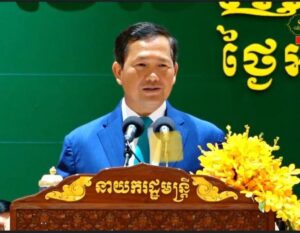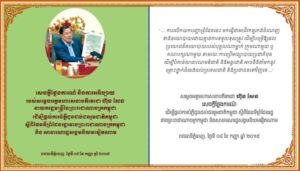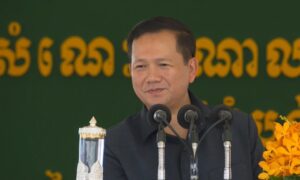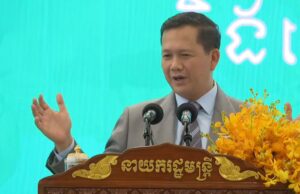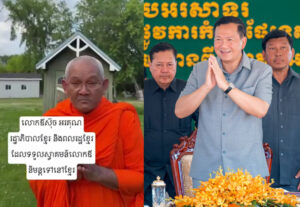Selected Comments Samdech Moha Bovor Thipadei Hun Manet, at the closing of the 2023 annual review and the work directions in 2024, and the launch of the strategic plan for the development of labor, social security and vocational training 2024-2028
 Selected Comments Samdech Moha Bovor Thipadei Hun Manet, at the closing of the 2023 annual review and the work directions in 2024, and the launch of the strategic plan for the development of labor, social security and vocational training 2024-2028
Selected Comments Samdech Moha Bovor Thipadei Hun Manet, at the closing of the 2023 annual review and the work directions in 2024, and the launch of the strategic plan for the development of labor, social security and vocational training 2024-2028
Selected Comments Samdech Moha Bovor Thipadei Hun Manet, at the closing of the 2023 annual review and the work directions in 2024, and the launch of the strategic plan for the development of labor, social security and vocational training 2024-2028
[Unofficial Translation]
**********
[4]
[The prepared text] The Ministry of Labor and Vocational Training must strive to successfully implement the reform measures introduced by the Royal Government at the 19th Royal Government-Private Sector Forum on November 13, 2023, by facilitating the provision of various services and a series of public services in response to requests from the private sector. (1) this work must be done urgently by the end of March 2024 to facilitate our work. As a result, we are reforming to help the private sector […], we have put in place a lot of policies, but the key of implementation is to ensure efficiency […] reduce unnecessary complications. As for the area concerning labor, make the procedural services more flexible, and digitalize it […]
[5]
(2) Put the policy on top, but do not shake the bottom is impossible, or shake below, there is no strategy, it is confusing
For sub-national institutions, the capital, provincial, district and municipal authorities involved in these tasks, in order to implement the principles/plans successfully, there needs a sustainable formula and a single role to play. Otherwise, what we introduced at the top will not be performing at the bottom. Or if there is performance at the bottom but there were no strategic directions, it is also chaotic. Thus, it requires discipline in the national and (sub) national administration, and the implementors must understand the framework of rights and obligations. We decentralize and deconcentrate, empowering local practice to be flexible […] within the four strategic frameworks set out at the national level. This means that the national level sets the direction, sets the boundaries in cooperation between various professional institutions, and the sub-national level continues to apply various skills so that we can ensure discipline, order and efficiency in work […]
(3) Three major issues with the Thai government: politics and security, economy and employment
There are various interpretations, especially on some sensitive points, that the government betrayed the national interests owing to the agreement it goes into with Thailand […] we have discussed numerous issues but let me summon them into three major ones. Firstly, politics, diplomacy and security […] strategically, we agree on raising the level of bilateral relations from a strong partnership for peace and prosperity in 2017 to a strategic partnership level […]; secondly, on the economic front, (and) thirdly, issues relating to our workers […]. In terms of economics, the Royal Government has set out a number of initiatives, and the Royal Government of Thailand has agreed and discussed further, and raised a number of initiatives for us to figure out mechanisms to strengthen trade relations […] and regarding job creation […] you know we have institutions that create jobs – the government, NGOs, civil society organizations, the self-employed group, and fourth, the private sector […] the attraction of the private sector through this meeting (with the Thai investors) is to create (more jobs). With Thailand, we have a trade of eight billion (US dollars) […] we have signed five MOUs yesterday, including a customs agreement to facilitate this workflow […]
(4) Two things – oil and maritime border in Cambodia-Thailand OCA
In Thailand, we have been able to accomplish another task that has been stagnant for 20 years. We have agreed to start thinking about the joint extraction of oil we have in the OCA (overlapping claim are) in (the offshore) region. That is why some (in the opposition) call me a traitor […] I would like to explain […] in this OCA, there are two factors involved. The first is the oil issue, the second is the maritime border issue. The border affairs, we must continue to negotiate carefully and to protect national interests, and national sovereignty. Based on the techniques, the negotiation will take a long time. At the same time, we know that there is oil in that area and this oil does not belong to anyone. Technically studied, some of it is on our side and some of it is on the Thai side […]
(5) Extracting oil together will give Cambodia and Thailand the opportunity to breathe through their own noses in the future
People may ask why we need to consider this? Energy security is a long-term strategy for Cambodia and Thailand alike […] what I wanted to say we cannot depend entirely on other people’s tube to breath in the air or we would lose out national ownership or independence. Therefore, we need to reduce our dependency on things that are far away and depend on ourselves, including our energy sector. Opening the door to learning and extracting the oil together will give Cambodia and Thailand the opportunity to breathe through their own noses in the future […]
(6) Distinguish between economic interests and maritime border negotiations
[…] The petrochemical industry […] creates jobs in the fields related to oil exploration […] long-term energy security ensures the flow of economic development in all sectors […] would the efforts to withdraw benefit for the nation and the people and ensure the long-term energy security be a betrayal (to the country)? […] please distinguish between economic interests and maritime border negotiations, which we will continue to work on it with the technical team […] solving the (border) issue is to end (misunderstanding) and ensure that our children and the children of the neighboring countries do not look at each other unfairly, in a quarrel way, and conflict. Would doing this be a treason? Not at all. It is a long-term solution to national problems […] so, together we remove the setbacks and jointly take advantage of the OCA (Overlapping Claims Area) […]
(7) Consulate General in Songkhla; work permit visa and renewal fees and stickers, mobile NSSF transfer
In the two meetings with the Thai Prime Minister, we discussed a number of issues with the Royal Government of Thailand. First, Cambodia decided to set up a consulate general in Songkhla, the Thai side agreed. We have set the location and plan to open soon […] to facilitate support services for our citizens working in southern Thailand […]; regarding the work permit visas, we have agreed to bring the cost down from 2,000 baht to 500 baht, and we will apply it from November. The Thai side has also agreed to reduce the renewal fee from 1,900 baht to 500 baht, as negotiated […] we also have more in discussion. We request the transfer of mobile social security system between the two countries. What does that mean? […] where there is NSSF (national social security fund), when our workers go to work in Thailand, they can transfer their NSSF to the working place (to continue it) […] the same applies to Thais who work in Cambodia […] we have asked the Thai side to provide stickers of work permit visas on travel documents to workers at the time of immigration […] rather than having to come for it at the (Thai) embassy (in Phnom Penh) […]
(8) To consider organizing the Cambodian and Thai Sankranta
I asked (the Thai Prime Ministere) His Excellency Setha Thavisin as the New Year/Sangkranta is approaching, if we can celebrate the New Year or Sangkranta (of the two countries together). There have been some confusions regarding the fact that Thai asked for the accession of Sankranta as one of the world heritages. Thailand does not take away what belong to the Cambodians. Countries holding on with Buddhism are celebrating Sangkranta. (Thailand) works on entitling the Thai Sangkranta. They have not asked to list the Cambodian (Sangkanta). We have our own Sangkranta. The Ministry of Culture and Fione Arts has the other day considered seeking the placement of the Cambodian Sankranta as one of the world heritages […] do not cause strife between the two nations over confusions […] and I think the Ministry of Culture and Fine Arts should organize a Khmer national identity to showcase what (belongs or identifies Khmer) for children of the next generation to understand clearly so as not to be confused as to what (belongs to Khmer, and/or Thai) […]
(9) Request the Thai Prime Minister to forgo the reentry visa fee for the month of April
[…] let me get back to the Sangkranta issue […] I talked to the Thai Prime Minister, “as we are close to the New Year, maybe you and join me in giving our people on both sides the gift that they do not have to pay the (re-entry) visa fee. The Cambodian people who come to visit on New Year shall not have to pay the re-entry visas fees” […] the Thai Prime Minister says that (issue) would be fine to celebrate together […] this New Year, (the Minister of Labor and Vocational Training) His Excellency Heng Sour, should organize (the Khmer New Year) in some countries, such as in Korea, and join with our people to enjoy the festivity. Our embassies in every country that does not have workers could gather our students for this reason as a get together once in a long while […]
(10) 10 hours of achieving strategic achievements for the benefit of the nation and the people […] (I spent) 10 hours (in Thailand), but achieved strategic achievements, as well as a lot of initiatives for both countries […] some people asked if I was not tired at all to have a full-day schedule like that. For me, I wanted to fly home as soon as I could (finish the wrok that I go for) […] I wish to spend all the time available (finishing the works) rather than sitting and watching TV in the hotel […] to fulfill my every duty as the head of government and for the benefit of the nation and the people […]./.

